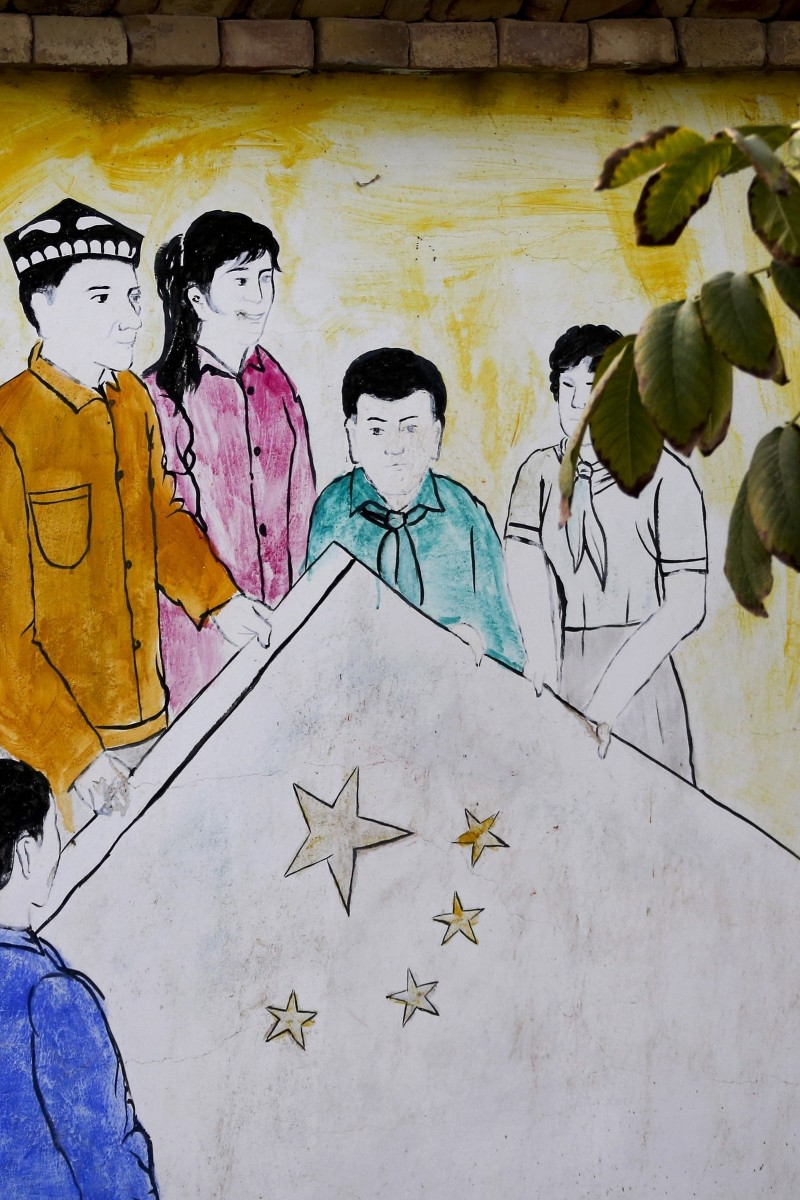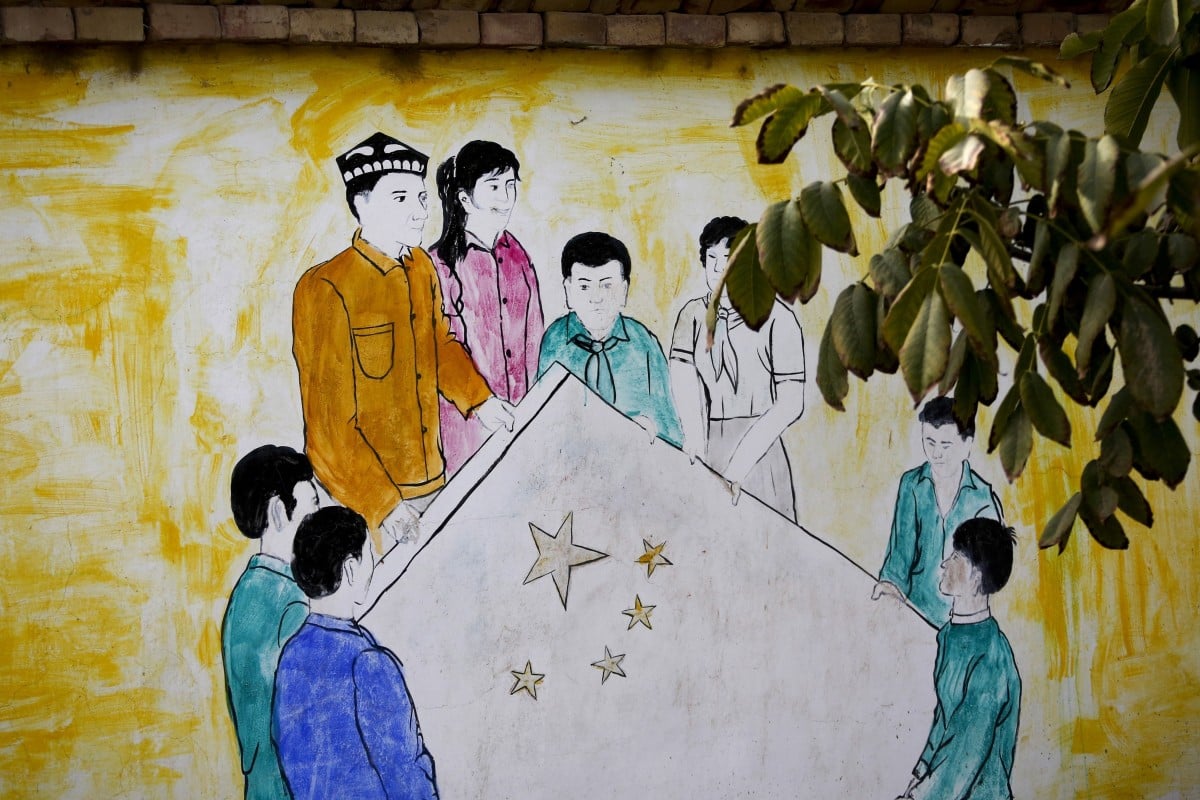
Part 1: China forces birth control on Uygur minority to curb Muslim population in Xinjiang
- Experts are calling the practice 'demographic genocide' as people with too many children are put into mass detention or sterilised
- Birth rates in the mostly Uygur regions of Hotan and Kashgar plunged by more than 60 per cent from 2015 to 2018
 A mural depicting Uygur and Han Chinese men and women carrying the national flag of China decorates the wall of a home at the Unity New Village in Hotan, in western China's Xinjiang region. Photo: AP
A mural depicting Uygur and Han Chinese men and women carrying the national flag of China decorates the wall of a home at the Unity New Village in Hotan, in western China's Xinjiang region. Photo: APReports have surfaced that the Chinese government is taking draconian measures to slash birth rates among Uygurs and other minorities as part of a sweeping campaign to curb its Muslim population, even as it encourages some of the country’s Han majority to have more children after changing its famous and long-standing 'one child' policy.
While individual women have spoken out before about forced birth control, the practice is far more widespread and systematic than previously known, according to an AP investigation based on government statistics, state documents and interviews with 30 ex-detainees, family members and a former detention camp instructor. The campaign over the past four years in the far west region of Xinjiang is leading to what some experts are calling a form of “demographic genocide.“
The state regularly subjects minority women to pregnancy checks, and forces intrauterine devices, sterilisation and even abortion on hundreds of thousands, the interviews and data show. Even while the use of IUDs and sterilisation has fallen nationwide, it is rising sharply in Xinjiang.
TikTok used by Chinese Uygurs to raise awareness of detention camps
The population control measures are backed by mass detention both as a threat and as a punishment for failure to comply. Having too many children is a major reason people are sent to detention camps, the AP found, with the parents of three or more taken away from their families unless they can pay huge fines. Police raid homes, terrifying parents as they search for hidden children.
After Gulnar Omirzakh, a Chinese-born Kazakh, had her third child, the government ordered her to get an IUD, a birth control device inserted into the uterus. Two years later, in January 2018, four officials in military camouflage came knocking at her door anyway. They gave Omirzakh, the penniless wife of a detained vegetable trader, three days to pay a US$2,685 fine for having more than two children.
If she didn’t, they warned, she would join her husband and a million other ethnic minorities locked up in internment camps.
“God bequeaths children on you. To prevent people from having children is wrong,” said Omirzakh, who tears up even now thinking back to that day. “They want to destroy us as a people.”
A Uygur woman and children sit on a motor-tricycle after school at the Unity New Village in Hotan, in western China's Xinjiang region. Photo: AP
The result of the birth control campaign is a climate of terror around having children, as seen in interview after interview. Birth rates in the mostly Uygur regions of Hotan and Kashgar plunged by more than 60 per cent from 2015 to 2018, the latest year available in government statistics. Across the Xinjiang region, birth rates continue to plummet, falling nearly 24 per cent last year alone — compared to just 4.2 per cent nationwide, statistics show.
The hundreds of millions of dollars the government pours into birth control has transformed Xinjiang from one of China’s fastest-growing regions to among its slowest in just a few years, according to new research obtained by The Associated Press in advance of publication by China scholar Adrian Zenz.
“This kind of drop is unprecedented ... there’s a ruthlessness to it,” said Zenz, a leading expert in the policing of China’s minority regions. “This is part of a wider control campaign to subjugate the Uygurs.”
The Chinese Foreign Ministry referred multiple requests for comment to the Xinjiang government, which did not respond. However, Chinese officials have said in the past that the new measures are merely meant to be fair, allowing both Han Chinese and ethnic minorities the same number of children.
Hongkongers know their city well, but less about minorities
For decades, China had one of the most extensive systems of minority entitlements in the world, with Uygurs and others getting more points on college entrance exams, hiring quotas for government posts and more relaxed birth control restrictions. Under China’s now-abandoned ‘one child’ policy, the authorities had long encouraged, often forced, contraceptives, sterilisation and abortion on Han Chinese. But minorities were allowed two children — three if they came from the countryside.
Under President Xi Jinping, those benefits are now being rolled back. In 2014, soon after Xi visited Xinjiang, the region’s top official said it was time to implement “equal family planning policies” for all ethnicities and “reduce and stabilise birth rates.” In the following years, the government declared that instead of just one child, Han Chinese could now have two, and three in Xinjiang’s rural areas, just like minorities.
But while equal on paper, in practice Han Chinese are largely spared the abortions, sterilisations, IUD insertions and detentions for having too many children that are forced on Xinjiang’s other ethnicities, interviews and data show. Some rural Muslims, like Omirzakh, are punished even for having the three children allowed by the law.
State-backed scholars have claimed for years that large rural religious families were at the root of bombings, knifings and other attacks the Xinjiang government blamed on Islamic terrorists. The growing Muslim population was a breeding ground for poverty and extremism, “heightening political risk,” said a 2017 paper by the head of the Institute of Sociology at the Xinjiang Academy of Social Sciences. Another cited as a key obstacle the religious belief that “the fetus is a gift from God.”
Key points from the new national security law
Outside experts say the birth control campaign is part of a state-orchestrated assault on the Uygurs to purge them of their faith and identity and forcibly assimilate them into the dominant Han Chinese culture. They’re subjected to political and religious re-education in camps and forced labour in factories, while their children are indoctrinated in orphanages. Uygurs, who are often but not always Muslim, are also tracked by a vast digital surveillance apparatus.
“The intention may not be to fully eliminate the Uygur population, but it will sharply diminish their vitality, making them easier to assimilate,” said Darren Byler, an expert on Uygurs at the University of Colorado.
Some go a step further.
“It’s genocide, full stop. It’s not immediate, shocking, mass-killing on the spot type genocide, but it’s slow, painful, creeping genocide,” said Joanne Smith Finley, who works at Newcastle University in the UK “These are direct means of genetically reducing the Uygur population.”